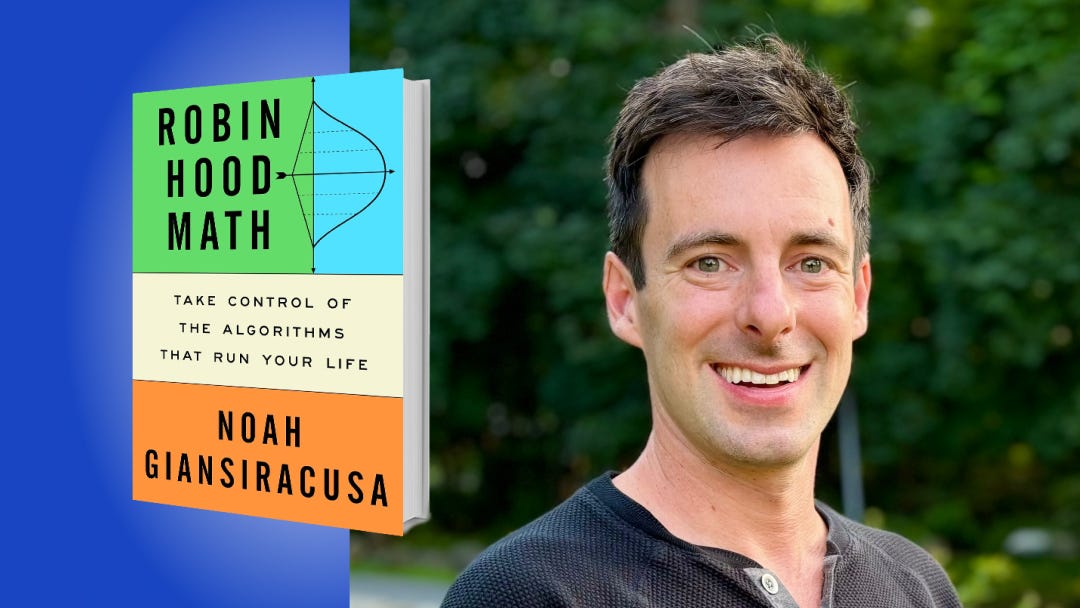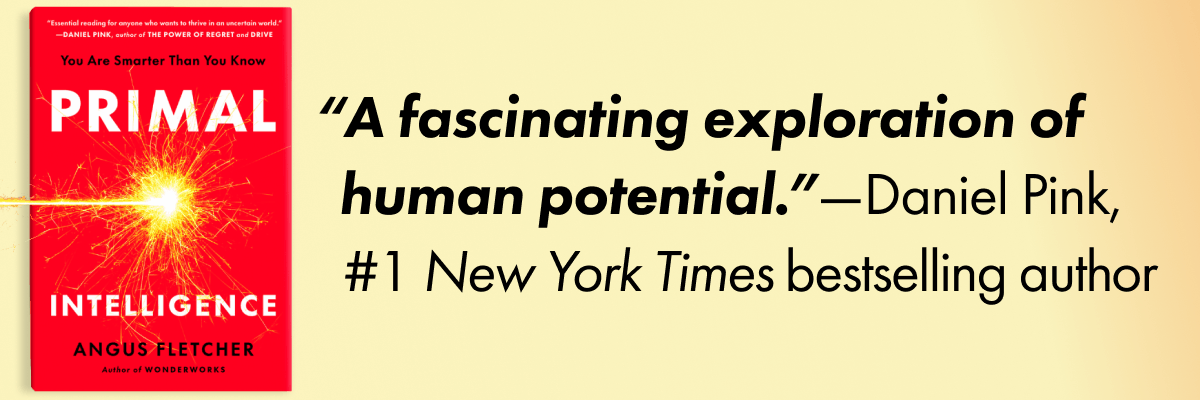The Algorithms Are Winning. Here’s How to Fight Back.
From your FICO score to your social feed, a new book helps you see—and shape—the forces behind the numbers.
Listen now on Spotify or Apple Podcasts:
If the phrase “math book” makes your eyes glaze over, stick with me—because this one’s different. In Robin Hood Math, mathematics professor Noah Giansiracusa shows how understanding a little math can help you push back against a world that keeps reducing you to a number. Credit scores, social media feeds, hiring algorithms—they’re all powered by formulas most of us never learned, but that shape nearly every aspect of our lives. Think of this book as a user’s manual for living in the age of algorithms. And don’t worry—there won’t be a quiz. Pick up a copy on Amazon or check out 5 of Noah’s big ideas below:
1. The world sees you as a number.
From likes and loves to friends and followers, social media is a numbers game: everything you do is boiled down to a handful of digits that measure your success and broadcast it to the world. You probably already know this and accept it when you sign up. What you might not know is that similar numbers games reach into nearly all aspects of your life.
Car companies today record and share your personal data almost as extensively as tech giants like Google and Meta. The largest grocery chain in the U.S. has a customer data repository bigger than the entire digital collection of the Library of Congress. Companies often use software to rate job applicants, reducing each applicant’s fate to a number. Some companies use software to tally worker “productivity points”—and we’re not just talking truck drivers, white-collar workers are increasingly subject to this corporate numbers game.
Applying for a loan? Check your FICO score, which summarizes your financial history and prospects into a single number. Hospitals and insurance companies crunch numbers to triage patients and determine coverage and costs. Need a kidney or liver? There’s a number for that, too: algorithms rank potential recipients to determine who gets the next available organ. It might feel like your life itself is just a number. To some government agencies, it is: FEMA puts the “value of a statistical life” at $7.5 million.
Treating people as numbers is not a new phenomenon, but the extent of it today is truly mind-boggling. The apps on our phones, computers, and in our cars have enabled the collection of a staggering amount of personal data. This data turns us all into numerical grist for the mathematical mill, allowing the powers that be to predict, optimize, and profit with unprecedented scale and success. What can we do to regain our humanity?
2. Math helps you reclaim agency.
Social media apps rely on algorithms to curate the endless stream of posts you see. These algorithms all rely on one single mathematical formula. Knowing this formula can help you take control of your social media experience. Knowing the math behind rankings and scoring systems, like college rankings and credit scores, can help you get the most out of these things while avoiding their pitfalls. The math of risk management helps you make informed decisions on everything from when and where to buy a house to which medications and medical procedures make the most sense for you; this lets you leverage the opinions of experts while focusing the decisions on your needs rather than their careers. These are just a few examples of mathematical empowerment.
“Treating people as numbers is not a new phenomenon, but the extent of it today is truly mind-boggling.”
Learning about the math formulas that techies, quants, and government officials use to get ahead won’t stop them from treating you like a number, but it will help you resist their undue influence and claw back some power in a world that privileges those with quantitative backgrounds at the expense of those without.
This week, Book of the Day is brought to you by Primal Intelligence, a new neuroscientific approach to improving mental performance by honing intuition, imagination, emotions, and common sense. Get your copy today.
3. Math is for everybody—really!
You are a math person. We all are. The problem isn’t you—it’s the way you’ve been taught math. Formulas come alive and stick in our heads when they help us with things we care about. Math concepts become more accessible and less intimidating when they’re distilled down to their essence and presented in relatable, practical settings.
When a person says they’re bad at math, they think they lack ability, but what they really lack is motivation. Think of everything you learned as a small child—like walking and talking—not because you were made to, but because an intense inner motivation drove you to do so. As a math professor, I assure you, those things are far harder than math. When you start to see math as a way of understanding and navigating the world, of resisting the influence of elites and reclaiming agency, math will seem a lot more useful, relevant, and accessible.
4. Math is about thinking clearly.
If you ask people what math is about, most will probably say “numbers and formulas” or maybe “shapes and proofs.” Math certainly involves a lot of those things, but that’s not what it is really about. Math is about thinking clearly and rationally.
Sometimes math helps you think with more precision. With the social media formula, you go from a vague sense that engagement is what matters to a precise recipe indicating what types of engagement matter and in what proportions. At other times, mathematical thinking is less about precision and more about discerning the signal from the noise. The formulas and math concepts behind risk management help you ballpark the odds of various occurrences and make rational decisions in the face of uncertainty. In those settings, it’s not about pinning things down precisely and computing exact numbers; it’s about making estimates scientifically and decisions strategically.
“Math is a tool to help you think more soundly and avoid common cognitive traps.”
Math in the classroom is all too often about correct answers and embarrassing mistakes. That’s not how I want you to see math. Math is a tool to help you think more soundly and avoid common cognitive traps. It’s a tool to help you, not to hurt and scare you. What’s much scarier than math is navigating a complex and confusing world without the assistance that math can provide.
5. When math helps the individual, it helps all of us.
When the math of risk management helps reduce vaccine hesitancy by helping people see that the risks they face from getting vaccinated are vastly outweighed by the risks they face from remaining unvaccinated, all of society is better protected. When the math of investing helps people of all backgrounds and education levels build better-performing portfolios that are less likely to tank, everybody benefits. When math helps people think more clearly and critically, voters are empowered and our democracy strengthened. Math is too powerful a tool to leave in the hands of the elites. It’s time to take math back from the rich and give it to the rest of us.





This hits hard.
It’s easy to feel like just another data point when systems prioritize scale over connection. The real magic happens when you flip the script and focus on building genuine relationships. That’s how you stop being “a number” and start being the one they remember.
Here’s a related piece I wrote on creating that kind of connection in sales:
👉 Why Your Customers Feel Like Zombies
https://open.substack.com/pub/engsales/p/why-your-customers-feel-like-zombies?r=jhbvp&utm_medium=ios
I was born in Gen X. I remember when we treated other people like human beings. We saw them in three dimensions. Some I liked, some I hated. But I never thought of another human being as a score, a number, or a commodity. Now we appear to be in the system of the cyber-daemon. Our society rates people by their credit scores. It treats people like commodities. People are not machines, to be weighed, used, and thrown away. We should not bow down to them, sacrifice our children to them, or sell them our souls to them for a mess of cyber-pottage. Rather, turn to the Master of reality and ask to have our hands filled with blessings.